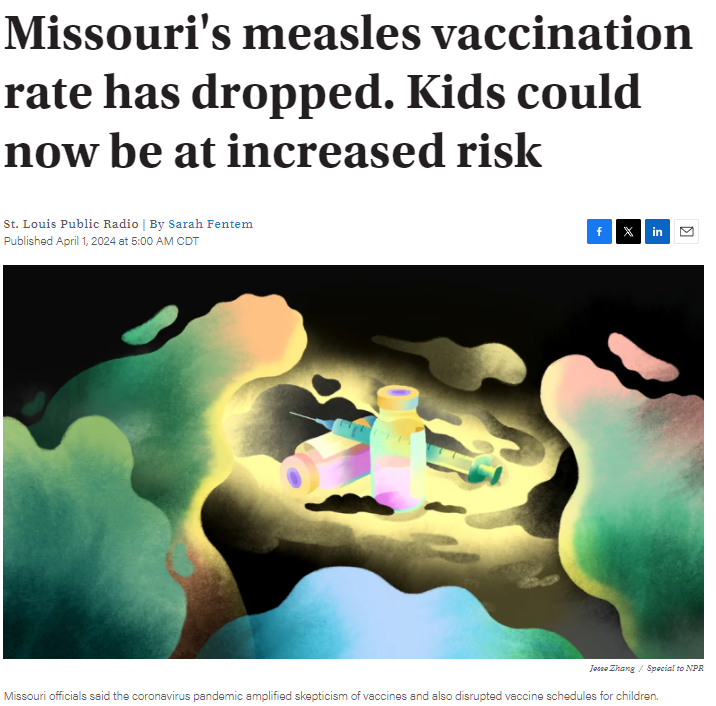 “It is time for Missourians to roll up their sleeves. COVID-19, Flu and RSV are here,” said Nicole Cope, Missouri Immunization Coalition’s Executive Director. “We must prepare for the triple-threat of anticipated respiratory infections this fall.”
“It is time for Missourians to roll up their sleeves. COVID-19, Flu and RSV are here,” said Nicole Cope, Missouri Immunization Coalition’s Executive Director. “We must prepare for the triple-threat of anticipated respiratory infections this fall.”
Among the triple-threat of vaccine-preventable respiratory infections, vaccines for COVID-19 and the flu remain in the media spotlight. RSV is a deadly respiratory illness as well, and newly approved and recommended vaccines to protect against RSV are also making recent headlines.
According to the Centers for Disease Control and Prevention (CDC), “Respiratory syncytial (sin-SISH-uhl) virus, or RSV, is a common respiratory virus that usually causes mild, cold-like symptoms. Most people recover in a week or two, but RSV can be serious. Infants and older adults are more likely to develop severe RSV and need hospitalization.”
In fact, the CDC says among adults 65 years and older, there are 60,000 to 160,000 hospitalizations every year in the United States, and 6,000 to 10,000 deaths. Among children younger than 5 years old, there are 58,000 to 80,000 hospitalizations, and 100 to 300 deaths.
One of those children hospitalized is the daughter of Alex McCoy. Alex’s story was published by Norton Children’s in Louisville, Kentucky. In her story on Norton Children’s website, McCoy says, “Isla Mae was only 7 weeks old and relying on a ventilator to breathe. She had been diagnosed with respiratory syncytial virus (RSV) less than 24 hours before, and we had no idea that this ‘cold’ would nearly take our precious girl’s life.”
As we prepare for respiratory illnesses this fall, our behavior may determine the severity of the upcoming season. “…people are getting back to behaving as they did before the pandemic, I think we’re likely to get back to the way things used to be with respiratory viruses as well,” said Dr. David Dowdy, a professor in Epidemiology, as reported by Lindsay Smith Rogers with Johns Hopkins Bloomberg School of Public Health.
The U.S. Food and Drug Administration (FDA) has approved two new RSV vaccines for older adults that could stem the tide in RSV cases this season. According to Yale Medicine, “The RSV vaccines work by introducing an inactivated RSV protein into the body, where it fuses to host cells and stimulates the immune system to recognize the actual RSV virus if/when it encounters it and help prevent severe disease.”

In early May, the FDA approved Arexvy™, developed by GSK, as the first RSV vaccine approved for use in the United States. GSK reported an overall efficacy of over 82% effective in preventing lung and lower airway infection from RSV in people aged 60 years and older, and over 94% effective in preventing lung and lower airway infection from RSV in people aged 60 years and older with asthma, diabetes, chronic obstructive pulmonary disease, congestive heart failure, advanced liver or kidney disease, or any chronic respiratory/pulmonary disease.
The second vaccine approved by the FDA for older adults is Abrysvo™ from Pfizer. According to Yale Medicine, “…Pfizer showed an efficacy of almost 89% against LRTD [lower respiratory tract disease] involving at least three symptoms in the first year after vaccination, and 78.6% mid-way through a second season in the data presented to the FDA.”
According to the CDC, “The decision to vaccinate an individual patient should be based on a discussion between the healthcare provider and the patient.” Moreover, the CDC says, “RSV vaccine is recommended as a single dose. Studies are ongoing to determine whether (and if so, when) revaccination may be needed.”
“We should all feel comfortable talking to our doctors and getting the facts about RSV vaccines,” said Cope. “Adults 60 and over should schedule that conversation with their healthcare provider today.”
In addition to its use in RSV prevention in older adults, in August, the FDA approved Abrysvo for pregnant individuals to prevent RSV in newborns. To maximize protection for babies after birth, the CDC recommends seasonal administration of one dose of RSV vaccine during weeks 32 through 36 of pregnancy. According to the FDA:
Among approximately 3,500 pregnant individuals who received Abrysvo, compared to approximately 3,500 pregnant individuals who received placebo, Abrysvo reduced the risk of severe LRTD by 81.8% within 90 days after birth, and 69.4% within 180 days after birth. In a subgroup of pregnant individuals who were 32 through 36 weeks gestational age, of whom approximately 1,500 received Abrysvo and 1,500 received placebo, Abrysvo reduced the risk of LRTD by 34.7%, and reduced the risk of severe LRTD by 91.1% within 90 days after birth when compared to placebo. Within 180 days after birth, Abrysvo reduced the risk of LRTD by 57.3% and by 76.5% for severe LRTD, when compared to placebo.
Baby Isla Mae contracted RSV years before the FDA approval of Abrysvo:
After hours of watching our frail baby get worse, they moved us upstairs to a hospital room for further observation. I had no clue how serious things were about to become. Another hour passed, and she got worse. They finally told us that they would have to put her on a ventilator. I fell to the floor sobbing. In my mind, someone on a breathing machine was basically dead. The worst hit me when I blatantly asked if she could die and was simply told, ‘Yes.’ I had only been this baby’s mother for seven short weeks; I could not lose her, said McCoy.
In addition to the two new vaccines, in July, the FDA approved Beyfortus™ (nirsevimab-alip), a new drug to prevent RSV in babies and toddlers. The FDA says, Beyfortus is for “…neonates and infants born during or entering their first RSV season, and in children up to 24 months of age who remain vulnerable to severe RSV disease through their second RSV season.”
toddlers. The FDA says, Beyfortus is for “…neonates and infants born during or entering their first RSV season, and in children up to 24 months of age who remain vulnerable to severe RSV disease through their second RSV season.”
According to the FDA, “Beyfortus is a monoclonal antibody with activity against RSV. Monoclonal antibodies are laboratory-made proteins that mimic the immune system’s ability to fight off harmful pathogens such as viruses. One dose of Beyfortus, administered as a single intramuscular injection prior to or during RSV season, may provide protection during the RSV season.” According to the CDC, “It provides critical protection during a baby’s first RSV season, when they’re most at risk for severe illness.”
“By the grace of God and the talented hands of very capable doctors and nurses, our Isla Mae began to improve. After being on the ventilator for five days, we were told that she was ready to start breathing on her own again. And just like that, as quickly as she had gotten sick, she got better,” said McCoy.
“Last November, the Missouri Department of Health and Senior Services issued an advisory in what they called a ‘significant early increase’ in RSV. We do not know how severe RSV will be this season, but we do know these two new vaccines and preventive drug will help protect those, like Isla Mae, at highest risk for severe disease,” said Cope. “That’s why vaccinations are so important.”
RSV vaccinations are not covered by any state funding except for those individuals covered by Medicare and Medicaid. On September 22, 2023, RSV was added to the CDC contract, and is now covered under the Vaccines for Children (VFC) program.
Helpful Links:
RSV ACIP Vaccine Recommendations
Published September 29, 2023




